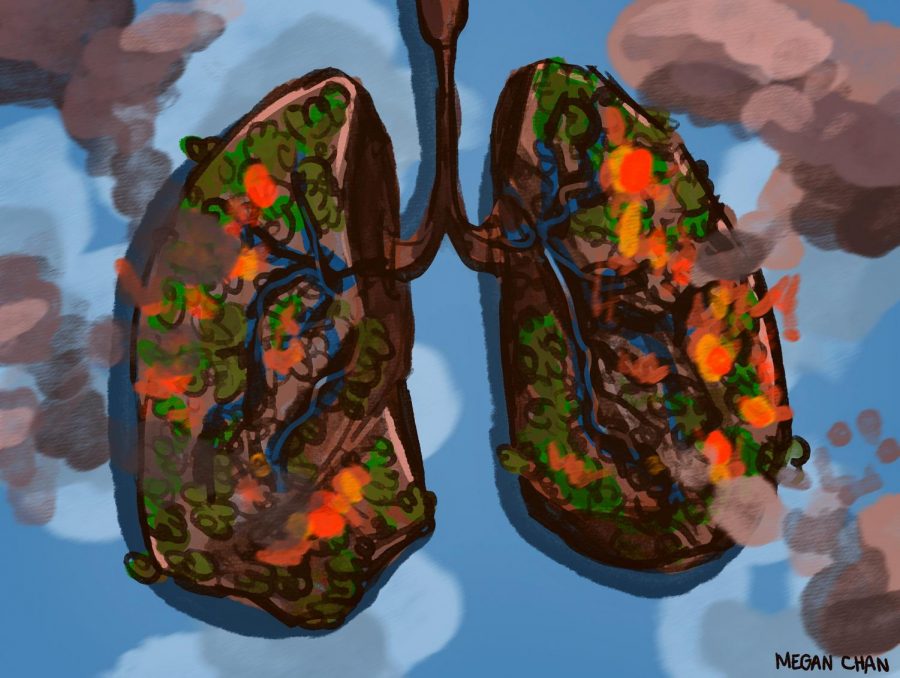Opinion: Smoke-Filled Lungs
A Burning Amazon Spells Disaster—For Brazil and the World
September 29, 2019
The Amazon rainforest. If it were a country, its 5.5 million square kilometers of dense jungle would create the 6th largest nation in the world. Its population would number 24 million humans, 40,000 species of plants, 400 mammal species, 1,300 unique birds, and 2.5 million species of insects — a full 10% of the world’s biodiversity.
The Amazon produces 20% of the world’s oxygen, and its plant species have enabled the creation of 13% of modern pharmaceuticals. But its greatest export? Rain. Evapotranspiration (water entering the atmosphere through a plant’s leaves) creates huge networks of rainfall above the forest and its surroundings, keeping the forest lush and verdant. The rain also serves a secondary purpose as a massive global air conditioning system, keeping global temperatures in check and holding climate change’s worst effects at bay.
However, despite its massive global influence and robust ecosystem, the Amazon is under active dismantlement, and it’s already showing signs of degradation. Since 1970, humans have carved, slashed, and burned 700,000 square kilometers from the forest, a full fifth of its historic range. That’s an area larger than the state of California, all of it reduced to cow pasture.
Since evapotranspiration amounts—and, by extension, rainfall in the Amazon—are dependent on the size of the forest, as the forest burns and withers, it steadily grows drier and drier. Already, more and more drought-tolerant species are appearing in the jungle, while water-loving plant populations are collapsing. Models suggest that if another fifth of the Amazon is destroyed—a very real, very terrifying outcome—the forest won’t be able to produce enough rain, and a chain reaction dry-off will spell the end of the entire forest.
Since 2018, things have only gone further downhill. The election of Brazilian president Jair Bolsonaro, a far-right nationalist who campaigned on a platform of further economically exploiting the Amazon, has led deforestation rates to spike almost 80% over a year.
Bolsonaro fired the former director of Brazil’s Ministry of Environment. He stripped down regulation intended to prevent deforestation, heavily dulled both oversight and financial penalties for illegal slashing-and-burning, and all the while made legal land-grab efforts much easier. Ranchers have seized Bolsonaro’s initiative, leading to more aggressive claims and significantly more deforestation in the Amazon.
While efforts by the other Latin American countries with a presence in the Amazon have helped curb the fires in their territories, because over 60% of the forest is on Brazilian land, the issue rages as hot as the fires consuming the jungle. International political pressure, spearheaded by France’s Macron and followed by EU and G7 discussion, has certainly helped push the issue, but Bolsonaro remains steadfastly focused on burning the forest.
And perhaps, just maybe, he has a good reason to. In a country with unemployment at a staggering 13.6% and GDP per capita one sixth of the US and Western Europe, agribusiness and ranching is the one bright sector in an otherwise stagnant and stifled economy. The very Western countries that rightfully decry the flaming rainforest are the same nations whose appetite for beef requires Brazil to create new agricultural land, by any means necessary.
There are tiny motes of hope among the darkness. After 50 years of flame, people are finally hearing about this. Figures like the Roman Catholic Pope and Leonardo DiCaprio are speaking out and acting out. The G7 conference lit a metaphorical fire under Bolsonaro, forcing him to bring in Brazil’s military to douse the flames.
But right now, it’s not enough. Thoughts and feelings, prayers, the meager $22 million G7 provided to put out the fires—it’s nowhere near enough. We need sweeping changes in attitudes across Brazil and the entirety of the world, because that’s who the Amazon belongs to. We need trade deals between Brazil and the world that bolster industry and manufacturing, not slash-and-burn deforestation. We need people willing to look at the greater good, to put aside petty squabbles and make a difference.
Climate change wasn’t ignited in a day, and it won’t be extinguished in a day either. For the sake of our world, every single one of us needs to fight for the Amazon’s very existence. But currently, all that exists are loud words and silent hands.
Through it all, stoically confronting increasingly inevitable annihilation, the forest burns.


